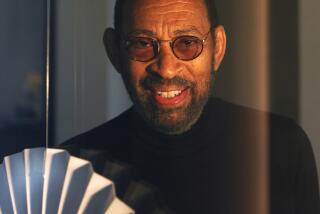Jerome Hines, 81; A Leading Voice at Metropolitan Opera for 41 Years
- Share via
Jerome Hines, whose bass voice rang out for a record-setting 41 years at the Metropolitan Opera House in New York City, has died. He was 81.
Hines, a resident of Scotch Plains, N.J., died Tuesday at Mount Sinai Hospital in Manhattan. The cause of death was not announced.
For the record:
12:00 a.m. Feb. 8, 2003 For The Record
Los Angeles Times Saturday February 08, 2003 Home Edition Main News Part A Page 2 National Desk 14 inches; 520 words Type of Material: Correction
Hines obituary -- The obituary of Jerome Hines, who sang for 41 years at the Metropolitan Opera House in New York City, in Thursday’s California section misspelled the name of the character Sarastro in Mozart’s “Die Zauberflote” as Sarasto.
Hines matched his thrillingly resonant voice with a commanding physique, at 6 feet 6 towering over his fellow singers. He was also known for probing the historical and psychological aspects of the characters he portrayed.
He determined, for instance, that Boris Godunov, the subject of Modest Mussorgsky’s opera of the same name, had died of a massive cerebral hemorrhage rather than a heart attack. When he fell to the floor clutching his head at the Met, it was General Manager Rudolf Bing who almost had the heart attack, and Hines went back to the standard portrayal.
It was in “Boris Godunov” that Hines made his Met debut in 1946, singing the minor role of the Sergeant. By 1954, he sang the title role. In all, his Met resume listed 45 characters in 39 operas, including Ramfis in Giuseppe Verdi’s “Aida,” Sarasto in Wolfgang Amadeus Mozart’s “Die Zauberflote,” King Marke in Wagner’s “Tristan und Isolde” and both King Philip and the Grand Inquisitor in Verdi’s “Don Carlos.” Altogether, he sang 868 performances there.
Hines was born Jerome Heinz in Hollywood in 1921 and studied voice privately while studying chemistry, mathematics and physics at UCLA. He worked briefly as a chemist before his career took off after appearing as Monterone in Verdi’s “Rigoletto” with the San Francisco Opera in 1941. He changed the spelling of his name from Heinz to Hines at the suggestion of his manager, Sol Hurok, to avert any anti-German sentiment during the war.
Hines became a born-again Christian in 1954 while composing “I Am the Way,” an opera on the life of Christ. He sang the title role at the Metropolitan Opera in 1968 and performed the work 93 times around the world.
“Reading the Bible and [feeling] the Lord dealing with me in the spirit were experiences that just turned my life upside down,” he said in a Times interview in 1988.
He often testified about his faith at homeless missions far from the glamorous life at Lincoln Center.
Hines turned to coaching later in his career, founding the Opera-Music Theatre Institute of New Jersey in 1987, but he also sang almost to the end of his life. In 2001, he appeared as the Grand Inquisitor in “Don Carlos” at the New England Conservatory of Music in Boston.
A Boston Globe reviewer wrote: “Now in his 80s, Hines is a little unsteady on his pins but turned his physical limitations to dramatic account. And when Hines sang, there was miraculously preserved much of the gorgeous timbre, steadiness of tone and enormous range that made him such a beloved artist.”
Hines was married to soprano Lucia Evangelista from 1952 until her death in 2000. He is survived by four sons: David Hines of Lynn, Mass.; Andrew Hines of Macungie, Pa.; John Heinz of Roselle Park, N.J., and Russell Ray Hines of Scotch Plains, N.J.; and eight grandchildren.
More to Read
The biggest entertainment stories
Get our big stories about Hollywood, film, television, music, arts, culture and more right in your inbox as soon as they publish.
You may occasionally receive promotional content from the Los Angeles Times.










